Znovu o homonymii, de re / de dicto a významu
V článku „Homonymie, cle dicto / de re a význam " (Organon F 8 (2001), N o . 3 ) jsem analyzovala tzv. de dicto / de re propoziční postoje.
More...We kindly inform you that, as long as the subject affiliation of our 300.000+ articles is in progress, you might get unsufficient or no results on your third level or second level search. In this case, please broaden your search criteria.
V článku „Homonymie, cle dicto / de re a význam " (Organon F 8 (2001), N o . 3 ) jsem analyzovala tzv. de dicto / de re propoziční postoje.
More...
Nikdy by mně nenapadlo vydávat to, co jsem ve svém Úvodu do analytické filosofu* (Herrmann a synové, Praha, 1992) napsal o Wittgenstcinově Traktátu / a nějakou hlubokou analýzu.
More...
K bodu 1. V ňom ma Jaroslav Peregrin kritizuje z a neadekvátnu interpretáciu pojmu tautológie v Traktáte, ktorú stotožňujem výlučne s výrokmi určitej logickej formy.
More...
Review of: John Langshaw Austin: Jak udělat něco slovy Filosofia, Praha 2000, 176 s. (přeložili Alena Bakešová, James Hill, Přemysl Maydl, Miroslav Petříček, Marcela Sedláčková, Petra Stehlíková a Otakar Vochoč pod vedením Jiřího Pechara.)
More...
Review of: Kathrin Glüer: Sprache und Regeln, Akademie Verlag. Berlin 1999. s. 249.
More...
Inšpiráciou na napísanie tohto článku bol pre mňa príspevok kolegyne Blaženy Švandovej publikovaný nedávno v Organone (pozri [6]).
More...
V jednom z předchozích čísel Organonu F byla otištěna stať Karla Berky, v e které se autor pokouší ukázat, že Gottlob Frege nebyl ve svých "logických zkoumáních" zdalek a tak úspěšný, jak se má obvykle za to ('On Frege's Philosophy o f Language - a Linguistic Approach', ORGANON F 6 , 1999, 111-118).
More...
V prílohe Organonu F, ktorá má názov K filozofii jazyka, vedy a iným problémom (1998), bol publikovaný aj článok môjho dlhoročného priateľa D. Kamhala Toto nie je kniha.
More...
Wittgenstein´s Tractatus Logico-Philosophicus can be regarded as the first attempt to use the concept of possible world in the analysis of language. Since Wittgenstein does not use the expression possible world, the author of this paper draws attention to those parts of Tractatus that presuppose such concept. Then the author concentrates on the relation of Wittgenstein´s conception of possible world to the metaphysics of Tractatus. For Wittgenstein, the possible world is any combination of state of affairs. On the other hand, some combinations of states of affairs are by the metaphysics of Tractatus excluded as illogical. The same is true of all possible distributions of attributes to ordered sets of objects that constitute states of affairs. It seems that Wittgenstein did not recognize these difficulties.
More...
So slovami sa často narába ako so zaklínadlami. Svedčí to o ich preceňovaní. Preceňujú ich však len tí, ktorí sa nimi dajú ovládať, ktorých možno urieknuť. Čarodejníci, mágovia slov, ovládajúci verbálne techniky, poznajú cenu, ktorú pripisujú slovám ich obete. Ovládajú čarovné formulky, ktoré otvárajú brány do svetov, v ktorých vládne mágia slov. Urieknutý človek sa z tohto sveta veľmi ťažko dostáva. Veď kto by rád opustil svet, v ktorom stačí len hovoriť?
More...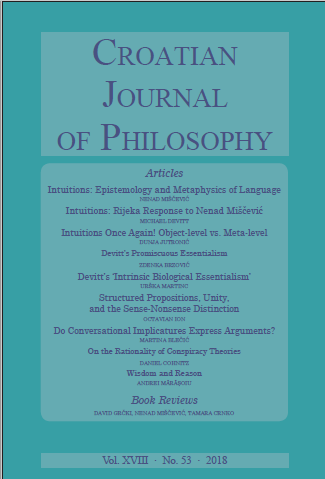
Back in the Good Old Days of Logical Positivism, theories of meaning were part of a normative project that sought not merely to describe the features of language and its use, but so to speak to separate the wheat from the chaff. In this paper, I side with Herman Cappelen (2013) in thinking that we need to rethink and reintroduce the important distinction between sense and nonsense that was ditched along with other normative aspirations during Logical Positivism’s spectacular demise. Despite this, my delineation of the bounds of sense is different from Cappelen’s. One of my goals in the present paper is to argue that category mistakes are paradigmatic examples of nonsensical sentences. To this end I describe one candidate for what it might be that makes category mistakes nonsensical.
More...
I suggest that the idea that conversational implicatures express argument can be significant for the notion of communicational responsibility. This underlying argument should be included in the reconstruction of conversational implicatures as a justification for the belief formed by the hearer on the basis of indirect communication. What makes this argument specific is the fact that its only explicit element is the speaker’s utterance taken as its initial premise. In order to reconstruct all the other elements, the hearer has to take into consideration factors such as the context and general knowledge of the shared language and the world. As the reconstruction of conversational implicatures in general, the reconstruction of implicatures as arguments is only potential. It is proposed that we should consider conversational implicatures as reason-giving arguments in which the speaker (arguer) addresses a hearer who does not need to reply. In those cases, the speaker is not trying to convince the hearer to accept his position but is explicitly stating a reason in support of his intended message. I believe that this approach can strengthen the idea of the speaker’s communicational responsibility for an implicated message even in the case when he wants to distance himself from it.
More...
Na článok [11] J. Viceníka som už reagoval krátkou črtou [1], v ktorej som si spytoval svedomie za napísanie kacírskej odpovede na jeho kacírsku otázku položenú v dialógu Úsilie o exaktnú filozofiu (pozri [lOj, 5458).
More...
Review of: J. R. Searle: Mysl, mozek, věda, MLADÁ FRONTA, PRAHA 1994, 129 s.
More...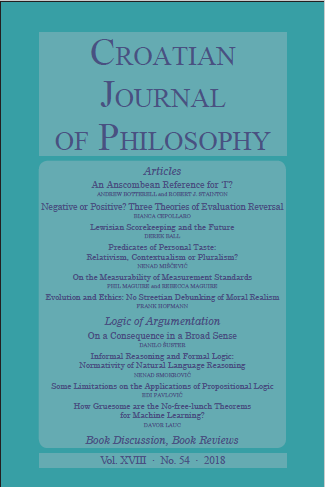
In this paper, I consider the phenomenon of evaluation reversal for two classes of evaluative terms that have received a great deal of attention in philosophy of language and linguistics: slurs and thick terms. I consider three approaches to analyze evaluation reversal: (i) lexical deflationist account, (ii) ambiguity account and (iii) echoic account. My purpose is mostly negative: my aim is to underline the shortcomings of these three strategies, in order to possibly pave the way for more suitable accounts.
More...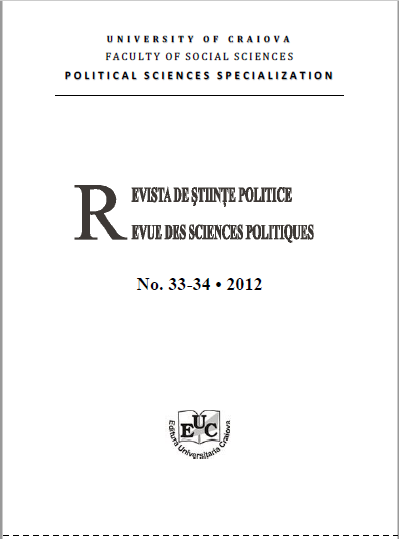
The aim of this paper is to reformulate in pragmatist and inferentialist terms some of the critical arguments stated by Françoise Thom (1993/1987) and Roger Scruton (2006) against what the former calls „wooden language”, and the latter calls „Eurospeak”. It will be argued that such a reformulation is more helpful in analyzing political discourse, if the use of value judgments – according to the two authors, a distinctive feature of wooden language – is seen as a rhetorical tactic called „persuasive redefinition” in informal logic and argumentation theory.
More...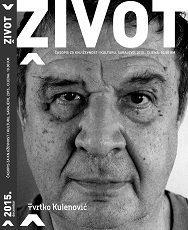
U 24. poglavlju Platonovog dijaloga „Sophistes" počinje rasprava s Parmenidovom tvrdnjom da čovjek ne može misliti niti govoriti o onome što nije (o nebiću, rekli bi, pretpostavljam, moderni filozofi). Tuđinac pred kojim čak i Sokrat šuti, gost iz Eleje, „prijatelj Parmenidovih i Zenonovih učenika i istaknuti filozof", dokazuje daje nebiće prepleteno s bićem i da „nebiće na neki način ipak jeste", bar u jeziku. Svoju tvrdnju Tuđinac dokazuje prirodom jezika, u kojem nije moguće povući jasne granice među riječima suprotnog značenja, tako da „pojmovi po svojoj prirodi stoje u vezi jedan s drugim".
More...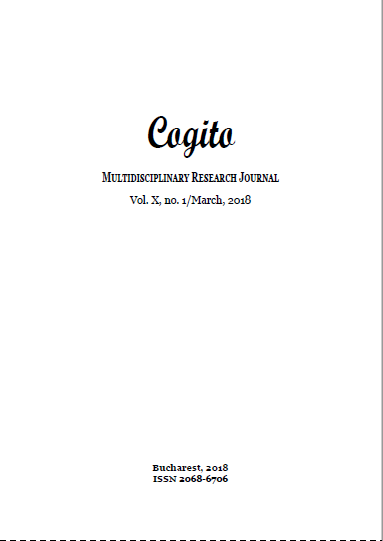
While for laymen the translation process still requires no more than the mastery of two languages because they see the translation process as the replacement of individual linguistic means, the increasing challenges in the field of translations lead to an increasingly complex intercultural transfer. Although cultural boundaries are easier to overcome as technology evolves, the transfer of information from a source language to a target language becomes more complex because of the modern media, which now uses all signs: visual, acoustic and verbal as a whole. They must be translated as such into the target culture. Therefore, the definition of what today can be considered a translation must be extended. The aim of this paper is to provide an insight into the development of this definition in translation science from the perspective of the translation unit and the position of the source text.
More...